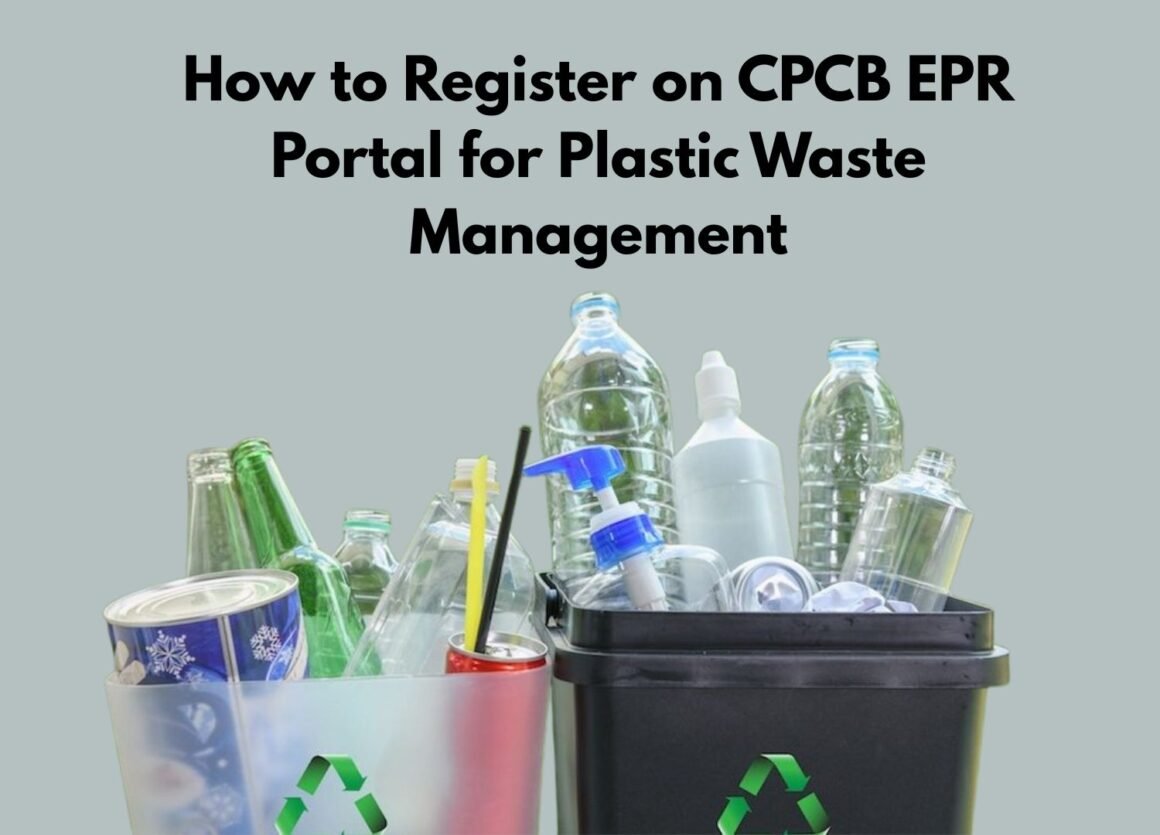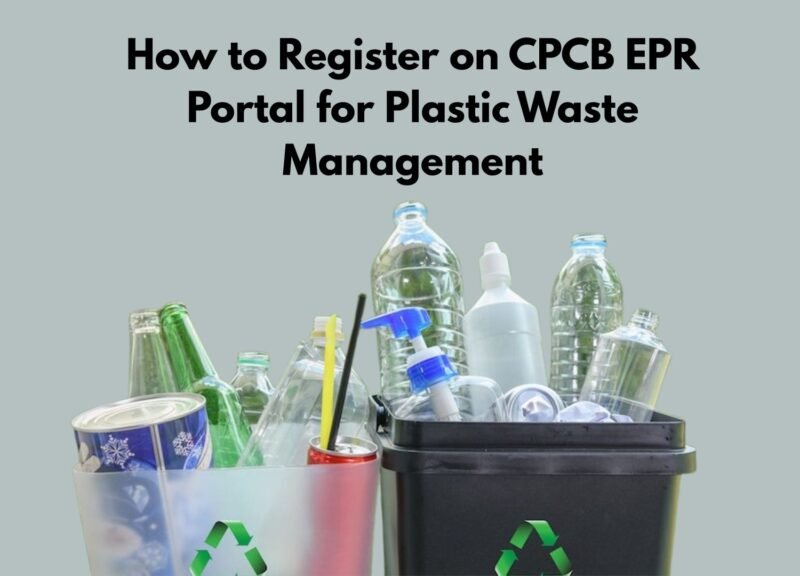Compliance is no longer a choice — CPCB EPR Registration is your legal gateway to doing business with plastic in India.
Extended Producer Responsibility (EPR) under the Plastic Waste Management Rules makes it mandatory for businesses that introduce plastic products or packaging into the Indian market to take responsibility for managing the waste generated from their products. To ensure compliance, the Central Pollution Control Board (CPCB) has developed the official online EPR portal for plastic packaging.
Every Producer, Importer, and Brand Owner (PIBO), along with Plastic Waste Processors (PWPs), must complete CPCB EPR Registration to legally operate and avoid penalties.

This step-by-step guide explains how to register on the CPCB EPR portal for Plastic Waste Management, eligibility requirements, documents needed, and the complete online registration process.
What is CPCB EPR Registration?
CPCB EPR Registration is a mandatory compliance process introduced by the Government of India under the Plastic Waste Management (PWM) Rules 2016, amended in 2022. It requires businesses that manufacture, import, sell, or use plastic packaging to register with the Central Pollution Control Board (CPCB) and take responsibility for the collection, recycling, and environmentally safe disposal of plastic waste.
EPR registration ensures that companies not only manage plastic waste but also contribute to India’s circular economy and sustainability goals.
Who Needs CPCB EPR Registration?
The following categories of businesses must apply for CPCB EPR Registration:
- Producers – Businesses that manufacture plastic packaging.
- Importers – Companies that import plastic packaging or products packed in plastic.
- Brand Owners (PIBOs) – Businesses that sell products under their brand name and use plastic packaging.
- Plastic Waste Processors (PWPs) – Businesses involved in recycling, co-processing, waste-to-energy, and plastic waste management operations.
Any company operating in more than two states must register with the CPCB, while companies operating in one or two states must register with the State Pollution Control Board (SPCB).
Why is CPCB EPR Registration Mandatory?
CPCB EPR Registration is legally mandatory under the PWM Rules. Without EPR registration, businesses cannot operate legally in India if they deal with plastic packaging. The government has also empowered CPCB to impose penalties, revoke licenses, and initiate legal action against companies that fail to comply.
The registration ensures:
- Traceability of plastic waste
- Waste reduction and recycling
- Accountability of producers and importers
- Promotion of sustainable plastic management practices
Documents Required for CPCB EPR Registration
Businesses applying for CPCB EPR Registration must submit the following documents:
- GST Certificate
- PAN Card of Company
- CIN Certificate (for companies registered under MCA)
- Aadhaar and PAN Card of Authorized Signatory
- IEC Certificate (for Importers)
- Details of Plastic Packaging Used (Type & Quantity)
- Action Plan for Plastic Waste Management
- Agreement with Plastic Waste Recyclers (if applicable)
- Company Registration Proof
- Self-Declaration Form
These documents must be uploaded during the online registration process on the CPCB EPR Portal.
Step-by-Step Registration Process on CPCB EPR Portal
Follow these steps to complete CPCB EPR Registration:
Step 1: Visit the Official Portal
Go to the CPCB EPR Plastic Waste Portal: https://eprplastic.cpcb.gov.in
Step 2: Create a New Account
- Click “Apply for Registration”
- Select your category: Producer/Importer/Brand Owner (PIBO) or Plastic Waste Processor (PWP)
- Enter your business details and complete OTP verification
Step 3: Fill the Application Form
- Provide business information (name, address, GST, PAN, CIN, etc.)
- Enter details of plastic packaging introduced to the market
- Upload information about collection and recycling plans
Step 4: Upload Required Documents
Upload all mandatory documents in PDF format as specified by CPCB.
Step 5: Submission and Review
Once submitted, CPCB reviews your application. If any corrections are needed, it will be sent back for clarification.
Step 6: Approval and Certificate
After verification, CPCB issues an EPR Registration Certificate with a unique EPR Registration Number.
Post Registration Compliance
After receiving the EPR Certificate, businesses must:
- Meet annual EPR targets
- Submit annual returns online
- Upload recycling certificates
- Maintain agreements with waste processors
- Ensure plastic traceability reporting
Penalties for Non-Compliance
Businesses that fail to register or comply may face:
- Heavy fines under Section 15 of Environment Protection Act
- Suspension of operations without notice
- Blacklisting and cancellation of EPR Certificate
Conclusion: CPCB EPR Registration
CPCB EPR Registration is not only a legal requirement but also an essential step toward responsible plastic waste management in India. Businesses must register through the CPCB EPR portal and follow the compliance process to avoid penalties and operate lawfully.
CPCB EPR Registration: Frequently Asked Questions (FAQs)
1. What is CPCB EPR Registration?
CPCB EPR Registration is a mandatory process under the Plastic Waste Management Rules that requires businesses handling plastic packaging to register with the Central Pollution Control Board for plastic waste management compliance.
2. Who needs CPCB EPR Registration?
All Producers, Importers, Brand Owners (PIBOs), and Plastic Waste Processors (PWPs) working with plastic packaging in India must register on the CPCB EPR portal.
3. Is EPR registration mandatory in India?
Yes, EPR registration is mandatory under Section 9(3) of the PWM Rules. Non-compliance can lead to fines and business restrictions.
4. How long does it take to get EPR approval from CPCB?
The CPCB generally processes applications within 15–30 working days, depending on the accuracy of submitted details and documents.
5. Can I operate without CPCB EPR Registration?
No, operating without EPR authorization is illegal and may result in environmental compensation penalties and shutdown notices.
6. What is the validity of the EPR Certificate?
The EPR Certificate is valid for one year and must be renewed annually by uploading compliance reports.
7. How do importers apply for EPR Registration?
Importers must register as PIBOs on the CPCB portal and upload IEC details along with packaging data before importing plastic-packaged goods.
8. What are EPR targets?
EPR targets define the percentage of plastic waste a company must collect and recycle based on the amount of packaging it introduces to the market.
9. What happens after EPR registration?
Businesses must upload annual return reports, meet recycling targets, and maintain tie-ups with registered plastic waste processors.
10. Can small businesses apply for CPCB EPR Registration?
Yes, even small businesses using plastic packaging must apply if they fall under the PIBO category.
FOR MORE BLOGS – beyondthepunchlines.com

 Add to favorites
Add to favorites






